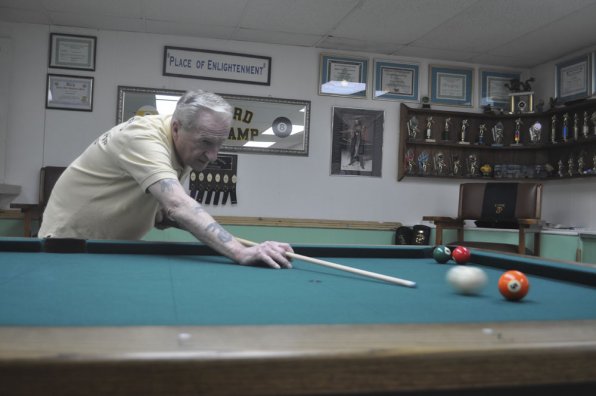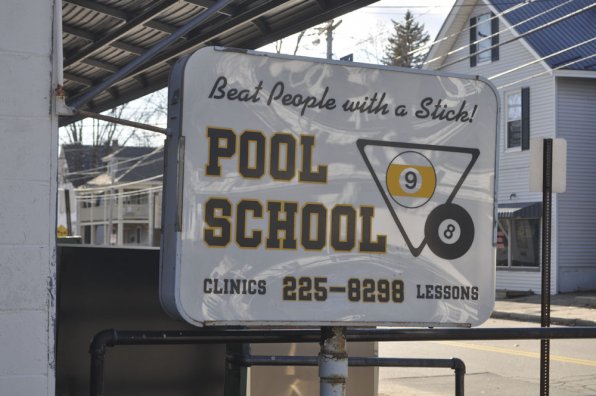Any business that encourages one to “beat people with a stick” is certain to draw The Insider's attention. So The Institute of Billiard Sciences – which offers such a proclamation on its exterior sign – understandably found a spot directly in our crosshairs.
There's no fighting involved, though. Only focus, as master instructor Ken Tewksbury spends his time training students on the nuances of billiards and the subtle techniques behind the classic bar-room game.
Tewksbury doesn't charge a fee for his knowledge, preferring instead to encourage donations, and isn't looking to get rich but would rather make only enough to keep the lights and heat on inside the building.
“It's not a business, it's a hobby,” Tewksbury said. “This is pure fun time for me.”
The game of billiards is science to Tewksbury. He's a master of angles and geometry who always thinks three shots ahead on the table. Having honed his skills at a high level for decades, including some semi-pro and national qualifying events, Tewksbury is a throwback and a purist who gets his greatest pleasure out of dissecting and correcting wayward strokes.
“I fix everything. It's a scientific factor. I'll show you how science and physics work on a pool table,” Tewksbury said. “It isn't a matter of banging a ball in a hole. You've got to think ahead.”
Tewksbury opened the school 15 years ago with humble intentions – “There was no room for a pool table at home,” he said – but has seen it reach unexpected heights.
He's hosted students from Canada, Russia, Germany, France, the Philippines, Puerto Rico, Alaska, Hawaii and most of the “lower 48 states,” he said. He offers to pick the visitors up at the airport and return them days later after molding their stroke.
Why travel all the way to Concord to learn to shoot pool?
“Because I teach the stuff nobody else teaches,” Tewksbury said. “I teach them how to win.”
Instead of the education one would receive at a “cookie-cutter” pool school, Tewksbury said, he studies each stroke inpidually and makes specific and unique corrections, many of which are so subtle veteran players would never diagnose them on their own.
“The only thing stopping you from going forward is knowledge,” he said. “I can give you the knowledge, and all you have to do is practice with it."
Tewksbury first picked up a cue stick in 1959 and was immediately absorbed by the physics of the game. Having worked in the auto industry for years, he was able to apply many of the lessons he used putting cars together on the pool table.
“It's angles, all angles,” Tewksbury said. “So it was a simple transition.”
It didn't take long for Tewksbury to realize the cerebral approach was all it took to win, and win frequently. He has more than 150 trophies on display at the Institute, and used to regularly win tournaments in the Concord area.
“Ninety-nine-point-nine percent of pool players hit the ball too hard,” Tewksbury said. “Once I realized that, it became very easy to beat them.”
He said he's always trying to stay three shots ahead on the table, noting that when a third anticipated shot looks difficult he'll often miss the second shot in such a way to put his opponent in a treacherous position.
Many of his lessons are influenced by martial arts principles, including the “Circle of Dragons” boot camp, a course designed to teach people to control the cue ball. The skills of concentration and observation are much more critical to Tewksbury than how hard you can drill a cue ball.
In almost two decades of working with students, Tewksbury hasn't come across a stroke he can't work with, and he doesn't expect he will. The blend of physical and mental instruction offered at the Institute is the kind Tewksbury is confident is timeless.
“It's concentrated. You have to know what you want to do to accomplish it,” he said. “It's all about where you're at with your game, so it's troubleshooting more than classes. But whatever you have for a problem, I'll fix it.”
Related content:










